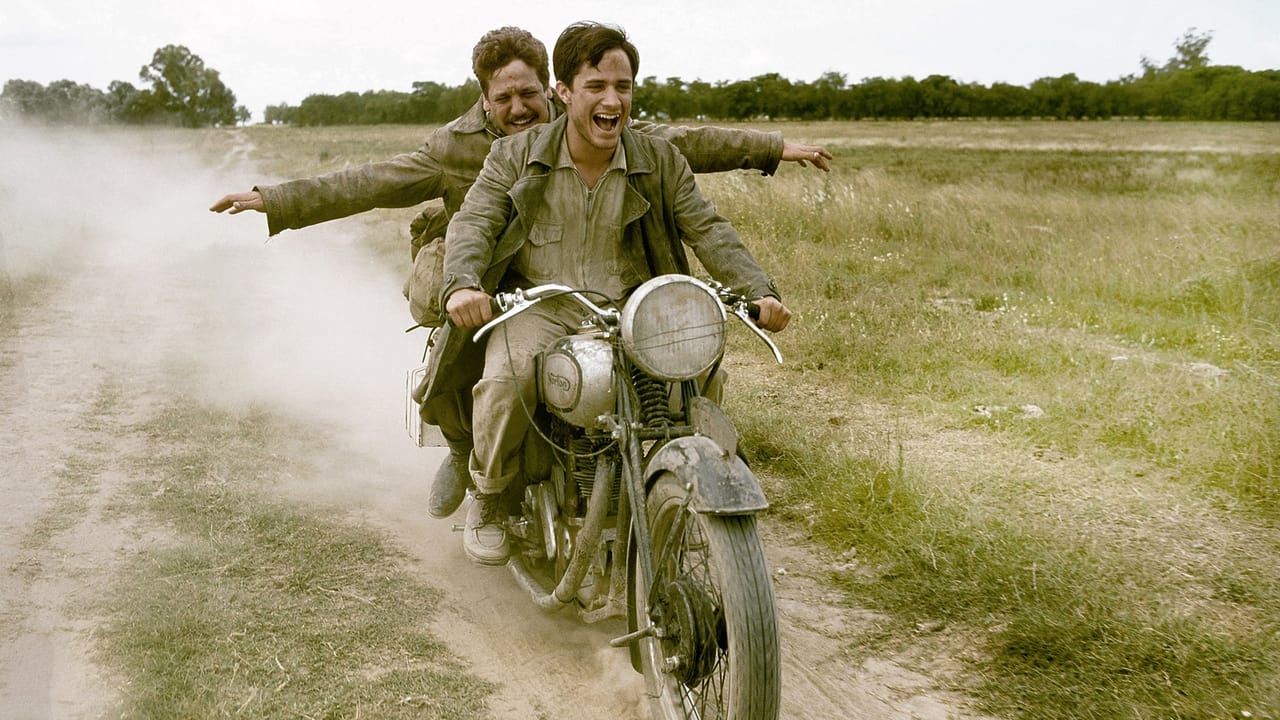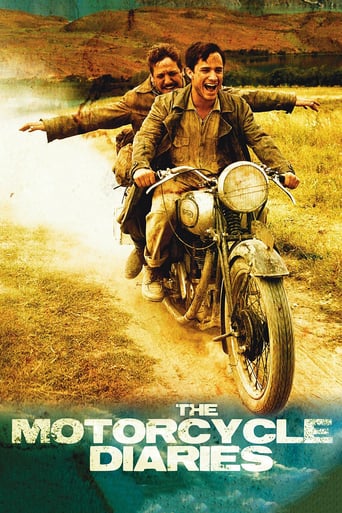Linbeymusol
Wonderful character development!
Interesteg
What makes it different from others?
Matcollis
This Movie Can Only Be Described With One Word.
InformationRap
This is one of the few movies I've ever seen where the whole audience broke into spontaneous, loud applause a third of the way in.
Wuchak
RELEASED IN 2004 and directed by Walter Salles, "The Motorcycle Diaries" chronicles events in 1952 South America when 23 year-old medical student Ernesto "Fuser" Guevara (Gael García Bernal) and 29 year-old Alberto "Mial" Granado (Rodrigo De la Serna) embark on an 8000 km trek across the continent from Argentina thru Chile, Peru and finishing in Venezuela. One of their main goals is to serve at a leper colony deep in the Amazon. The experience shows how Ernesto came to be called "Che" and cultivated his Marxist revolutionary ideology.I hate communism because, while it sounds good on paper, it just doesn't work in practice. It's a demotivating system that ensures everyone's equally poor, except of course for the ruling state class, which essentially becomes communistic royalty. To all intents and purposes they are the reviled "bourgeoisie" and the common people are the "proletariat," both of which communism sought to eliminate in the first place, which makes communism hypocritical. Furthermore, communism leads to all kinds of suffering and corruption, like waiting in long lines or bribing doctors and sellers for services & merchandise. Sure, capitalism has its downside, but it's an all-around superior system, which is why people from communistic states flee to capitalistic countries and not vice versa.Five years after the events of the movie, Che became a major figure in the Cuban Revolution, which history has proved to be thoroughly negative for the Cuban people. Che was sincerely compassionate toward the poor and his intentions were good, and the movie depicts this, but the answer he came to, communism, was intrinsically wrong. In short, his "remedy" was way worse than the problem he meant to cure.That said, the movie isn't really a political polemic, but merely a snapshot of Che as a young man, illustrating WHY he chose his radical course, mistaken as it was. It's an entertaining and informative nigh travelogue of South America, not to mention top-of-the-line filmmaking. Unfortunately, although Che's an interesting character, the constant bickering of the protagonists loses its appeal after the first half and the movie's encumbered by its annoying and wrongheaded propaganda, slight though it may be. It's like the flick tries to justify Che's politically-motivated slayings, which he later committed as a revolutionary (directly or indirectly) and admitted to doing out of "pure hatred."THE FILM RUNS 126 minutes and was shot in Argentina, Chile, Peru, Colombia, Venezuela & Cuba. WRITER: Jose Rivera wrote the script based on the diaries of Che Guevara & Alberto Granado.GRADE: B-
SnoopyStyle
In 1952, 23 year old medical student Ernesto Guevara de la Serna (Gael García Bernal) later known as Che Guevara decides to spend 4 months to ride around South America with 29 year old biochemist friend Alberto Granado (Rodrigo De la Serna) on an old beat-up motorcycle. There are girls, fights, breakdowns, sickness and most importantly Che's discovered connections to the people.Gael García Bernal is a real charmer and a convincing ladies man. He is handled with reverence. The country is beautiful. The story meanders like their trip. The relationship is not that compelling and they have no deep revelations. They are mostly a bickering couple. It's a little funny but repetitive. It's like a travelogue without much tension. If not for Che, this would be a rather unremarkable road movie.
Marc Israel
This is a film that wants to paint the picture of Che Gueverra's epiphany. It wants to be important. Brazilian Director Walter Salles (Central Staion) knows the basic approach of telling a chronological story, filled with visuals which tell the audience as much as the dialog. The idea of two friends embarking on a journey that could never be completed on its original terms (travelling South America on an old motorcycle with hardly any funds or plans to earn their way) makes for the small bit of drama we get. And that's the problem. The future history is irrelevant to the movie experience unless you are told otherwise, and we are not. Our lot is an expressed realization of inequity and injustice through roadside interviews, nothing first hand. That's not drama. Our boys struggling to get along despite their circumstances and ideals (one wants justice while the other comically wants women) seems to be what we are left with. Our two leads, Gael Garcia Bernal and Rodrigo de la Serna are compelling and keep our attention as the ultimate road trip duo. The music enchants the scenes bringing you into these travelers shoes, but their minds would never accept events this way. They came from family money and protected upbringings. It is an endearing movie at times but the change that is supposed to be taking place on screen is still somewhere in the writers' screenplay, you would have to believe. And here that's what you have to do.
Armand
it is not only an adaptation. or a political story. so, different by expectation, it is more profound, beautiful and touching. because it is a map. a travel. and the realities of a land. adventures and bricks for a manner to define reality. an universal subject who has the chance to have a splendid team who knows use it. Garcia Bernal does a splendid work. and the essence of this virtue is the art to transform his character in a image who can be Guevara or Kerouac. a wise science to explore each nuance of story and characters possibilities. for viewer, far to be only a show, it represents a form of experience. because it is a travel in heart of things. a lesson but out of didactic circles. remember of an age spirit, it is a homage to youth and definition of innocence in a special way. a film as a question. or, not only an artistic experience.

